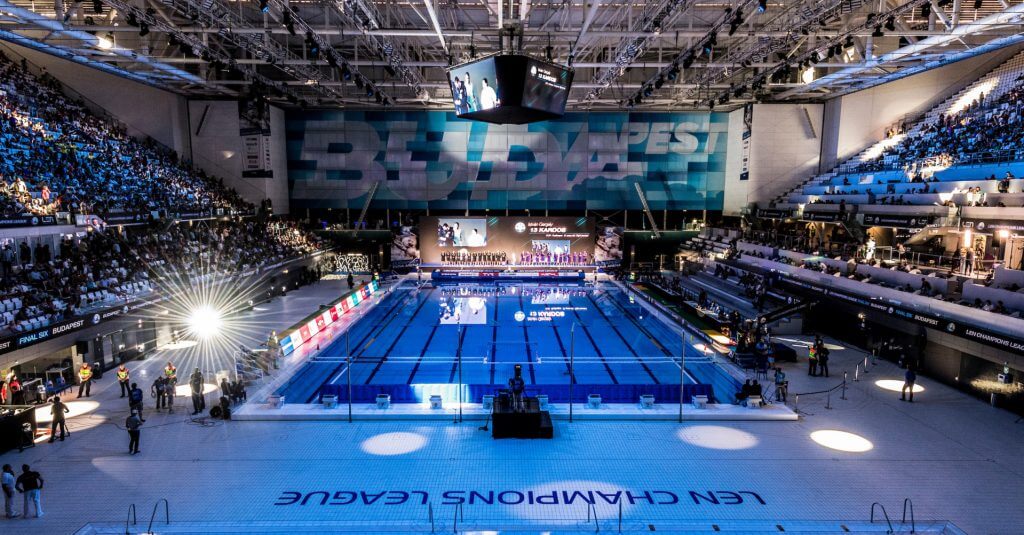Hope Of September European Swim Championships Fades As Politicians & Health Experts Point To Long Haul

A German Government ruling that there will be no sport in the country until at least the end of August, as part of plans for a gradual easing of lockdown measures as the summer wears on, is the first major sign that a tentative shift in the European Aquatics Championships from May to September is almost certain to be called of.
The European Swimming League (LEN) is to meet next week to discuss a number of issues, including the latest updates on prospects of being able to go ahead with a plan to hold the continent’s showcase aquatics event in Budapest this September.
Even if Budapest organisers and the Hungarian Government were to give the green light, the next question for LEN would be “what state are athletes in across Europe at the end of a summer inn which have continued to have access to pools, others – and the majority – not?
In Germany and the UK, two nations that account for a large number of Europe’s leading aquatic athletes, Government policies and pronouncements dod not envisage any return to a life without social-distancing until “there is a vaccine”, which is unlikely to be ready for at least another year.
Angela Merkel, the German Chancellor announced today that tentative easing of lockdown measures would come hand-in-hand with strict rules against mass-gathering events such as sport, concerts trade fairs and the like until at least August 31.
Germany’s 16 states agreed, while discussions go on about what that means for swimming pools and other sports venues.
Concrete regulations on the cancellation of events will be drawn up by individual states. It is expected that more information will become available in the coming weeks. Meanwhile, all public pools remains closed.
In new guidelines published on Wednesday, the government said large-scale events “play a major role in the dynamics of infection”, while close-contact gatherings, social and sporting, have contributed to the spread of coronavirus.
It is unclear, as yet, whether football matches behind closed doors can go ahead, given that a match cannot take place if players are to observe social distancing. The same applies to swimmers gathering for training, in shower rooms and so forth.
As of next week, shops of a size no more than 800m squared can reopen their doors, while some schools may start up again in phases and shift patterns from May 4.
Merkel said Germany had achieved “fragile intermediate success” through the strict measures it had imposed early in the global health emergency.
The country has 127,584 confirmed cases and has reported just 3,254 deaths, Germany’s Public Health body, the Robert Koch Institute recorded. The mortality rate is significantly below that of nations where politicians were slower to react and health systems were less adequately equipped to cope with a pandemic.
Even so, there was no hint of complacency from Merkel. The chancellor said Germany “must keep focused and keep going”, adding that they “do not have a lot of room for manoeuvre”.
Tentative easing of lockdown measures has also happened in Denmark, which reopened schools and nurseries for children up to the age of 11, and Spain, Europe’s worst hit country in terms of the number of infection cases, the Spanish construction and manufacturing sectors allowed to return to work, provisions attached.
Thousands of smaller shops in Austria reopened today, while in Italy, the European nation with the largest mortality rate, of more than 21,000 people, will allow outdoor sport such as tennis, golf and athletics to make a comeback from May 1. Pools remain closed in all those nations.
France, with almost 150,000 infections and more than 17,000 deaths, has extended its lockdown measures for four more weeks until May 11, while Belgian lockdown measures have been expend to May 3.
In Russia, veterans groups have called for President Vladimir Putin to postpone the World War Two 75th anniversary victory parade planned for May 9, on grounds of the risks posed to participants at a time when the country is ramping up lockdown measures at a time when infections reported in official statistics are growing at around 3,500 a day.
Meanwhile, in the UK, Prof. Neil Ferguson, the Imperial College epidemiologist whose coronavirus research directly led to the British Government introducing the lockdown, said that even when it feels safe to relay containment measures, “we will have to maintain some form of social distancing, a significant level of social distancing, probably indefinitely until we have a vaccine available.”
The Government gave no official word but Nadine Dorries, a junior health minister who was the first politicians in the UK to become infected and serve a period in quarantine,, took to Twitter to say:
“Journalists should stop asking about an ‘exit strategy.’ There is only one way we can ‘exit’ full lockdown and that is when we have a vaccine. Until then, we need to find ways we can adapt society and strike a balance between the health of the nation and our economy . #COVID19”
After organisers of the Tour de France announced plans to go ahead with their event in August and September, Devi Sridhar, the chair of Global Public Health at the University of Edinburgh and also a key adviser to the Scottish government on the Covid-19 pandemic, described the move as “a recipe for disaster”. He added:
“The wise thing to do is cancel for this year. It’s a painful decision but they have no choice.”
That is the same issue and question facing the top table of the European Swimming League next week.



